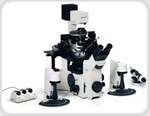| | A biology researcher at The University of Texas at Arlington will be using the high-tech tools provided by the North Texas Genome Center to shed light on the role of 'jumping genes'. | |
|
| | A table in a recently published paper tells the story of 30 families who have, sometimes after years of searching, finally received an answer about the condition that has plagued one or more family members. | |
|
| |  Chromatin remodeling is an important mechanism of regulating eukaryotic gene expression, which makes tightly condensed DNA accessible to various regulatory factors, such as transcription factors and components of DNA replication. Chromatin remodeling is an important mechanism of regulating eukaryotic gene expression, which makes tightly condensed DNA accessible to various regulatory factors, such as transcription factors and components of DNA replication. | |
|
| | A multi-disciplinary team at KK Women's and Children's Hospital has developed a test to enable faster diagnosis of rare diseases to help critically ill children. | |
|
| | University of Colorado Boulder researchers have discovered a key mechanism by which skin begins to develop in embryos, shedding light on the genetic roots of birth defects like cleft palate and paving the way for development of more functional skin grafts for burn victims. | |
|
| |  Facing incurable breast cancer at age 55, MaryAnne DiCanto put her faith in "precision medicine" — in which doctors try to match patients with drugs that target the genetic mutations in their tumors. She underwent repeated biopsies to identify therapies that might help. Facing incurable breast cancer at age 55, MaryAnne DiCanto put her faith in "precision medicine" — in which doctors try to match patients with drugs that target the genetic mutations in their tumors. She underwent repeated biopsies to identify therapies that might help. | |
|
| | UT Southwestern researchers today report the first use of CRISPR genome-wide screening to identify a gene that helps cells resist flavivirus infection. That nasty class of pathogens includes West Nile virus, dengue fever, Zika virus, and yellow fever. | |
|
| | Children who take paracetamol during their first two years of life may be at a higher risk of developing asthma by the age of 18, especially if they have a particular genetic makeup, according to new research presented at the European Respiratory Society International Congress today. | |
|
| | Research has shed new light on genetic processes that may one day lead to the development of therapies that can slow, or even reverse, how our cells age. | |
|
| |  MicroRNAs (miRNAs) are small, short non-coding RNAs that bind to specific messenger RNAs (mRNAs) and regulate gene expression either by degradation or by translational inhibition of the mRNA. MicroRNAs (miRNAs) are small, short non-coding RNAs that bind to specific messenger RNAs (mRNAs) and regulate gene expression either by degradation or by translational inhibition of the mRNA. | |
|
| |  Diverse microbial communities exist all around Earth, both within our bodies and our external environment. Diverse microbial communities exist all around Earth, both within our bodies and our external environment. | |
|
| | _45df1d371be642fcb60a88d42414e11a-310x240__636728473457919928_multisizecolor_150_gray.jpg) Ataxia is a degenerative disease affecting the nervous system, presenting poor coordination and movement, difficulties with speech, walking, fine motor skills, swallowing, and vision. It mainly affects people over 18 (adult-onset). Ataxia is a degenerative disease affecting the nervous system, presenting poor coordination and movement, difficulties with speech, walking, fine motor skills, swallowing, and vision. It mainly affects people over 18 (adult-onset). | |
|
| | DNA methylation is an important epigenetic process which has diverse roles to regulate gene expression, imprinted genes, inactivation of X chromosomes, and the dysregulation of these patterns in diseases. | |
|
| | Human papillomavirus is widely known to cause nearly all cases of cervical cancer. However, you might not know that HPV also causes 70 percent of oropharyngeal cancer, a subset of head and neck cancers that affect the mouth, tongue, and tonsils. | |
|
| | Researchers at St. Jude Children's Research Hospital have created a massive database of the changes in gene activity of individual cells in the cerebellum during embryonic development and immediately after birth. | |
|
| |  Single-cell microinjection system represents an innovative way to integrate exogenous material into cells and to extract and transmit cellular components between cells. Single-cell microinjection system represents an innovative way to integrate exogenous material into cells and to extract and transmit cellular components between cells. | |
|
| | Getting magnetic resonance imaging scans twice a year instead of one annual mammogram is far more effective at detecting early breast cancers in young women with a high-risk genetic profile than mammograms alone, according to a research team based at the University of Chicago Medicine and the University of Washington, Seattle. | |






_45df1d371be642fcb60a88d42414e11a-310x240__636728473457919928_multisizecolor_150_gray.jpg)

































No hay comentarios:
Publicar un comentario